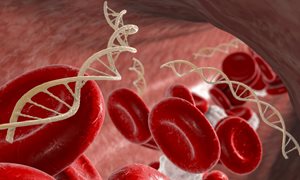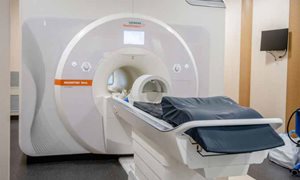
A protein on the surface of prostate cancer cells is an entry point for earlier and safer treatment of prostate cancer. That is one of the conclusions from the thesis of Bastiaan Privé from Radboud university medical center. He studied the effectiveness and toxicity of this therapy, and the usefulness of this protein in imaging.
The prostate is an organ located under the bladder in men, and plays an important role in reproduction. Prostate cancer is the second leading cause of male cancer deaths in the Western world. In the Netherlands, 2,800 men die annually from the effects of this disease. The treatment of prostate cancer is currently based on the removal or irradiation of the prostate. Unfortunately, in many patients, the cancer returns, making patients dependent on immunotherapy, chemotherapy or hormone therapy. Therefore, new treatment options are needed to improve life expectancy.
New therapy
One of the targets in the search for better detection and treatment of prostate cancer is PSMA, a protein on the cell surface of prostate cancer cells. This makes it a suitable target for new therapies, says Bastiaan Privé, radiation oncologist in training at Erasmus MC and postdoc at the Imaging Department of the Radboudumc. During his PhD program, he investigated this radioligand therapy. "We use molecules that bind to PSMA and to which radioactive particles are attached. This allows us to irradiate cancer cells very specifically with few side effects."
To test the effect of this therapy, Privé and his colleagues set up a study of ten patients with early prostate cancer. This study was the first worldwide at this stage, when men still have few symptoms. Treatment with Lutetium-PSMA was effective, allowing patients to delay follow-up therapy. "Based on our results, the drug appears to be able to postpone more severe follow-up treatment in at least half of patients with prostate cancer in the early stages of the disease", says Privé. "Moreover, the therapy is safe and does not cause serious side effects."
These favorable results prompted the researchers to set up a larger study on the efficacy of Lutetium-PSMA. In this ongoing study, they plan to measure the drug's effectiveness in a group of 58 patients. "This study should provide more evidence of the efficacy of this new therapy," says Privé. "This could lead to a new treatment option, where we can treat patients at an earlier stage of the disease in a very targeted way."
PSMA-PET
During his PhD program, Privé also conducted research into the usability of PSMA in prostate cancer imaging. In his study, he and his colleagues compared these PSMA-PET scans with MRI scans of the prostate and the analysis of biopsies, pieces of tissue from the tumor. 75 people with suspected prostate cancer received a PSMA-PET scan as well as an MRI scan of their prostate.
Preliminary results show that this new method is able to detect prostate cancer well. "Many radiologists have difficulty reading a prostate MRI scan," explains Privé. "Doctors may be better able to determine the stage of prostate cancer with a combination of a PSMA-PET and an MRI scan. This may allow us to avoid biopsies in the future."
Future
PSMA opens new doors in the field of therapy and diagnosis of prostate cancer, Privé concludes. Both PSMA-PET and radioligand therapy can improve the quality of life and care for people with prostate cancer. "In the future, we will focus more on the tumors than on treatments affecting the whole body," Privé says. "But still, more research is needed to be able to offer this therapy to the right patients."
More information about this dissertation
Dissertation on September 2 at 10:30 a.m. by Bastiaan Privé. Title of the dissertation: PSMA Theranostics in prostate cancer. The dissertation can be found here. (Co-)promoters: Prof. Dr. J. Nagarajah, Prof. Dr. M. Gotthardt, Prof. Dr. S. Heskamp and Dr. N. Mehra. The defense can be followed via this livestream.
-
Want to know more about these subjects? Click on the buttons below for more news.
Related news items






